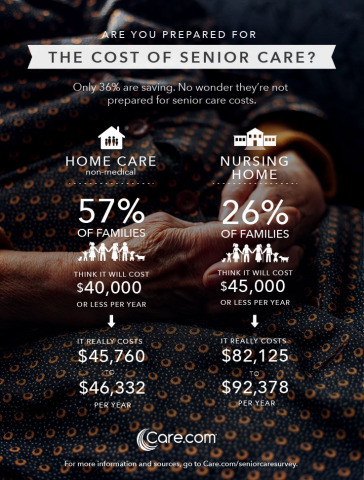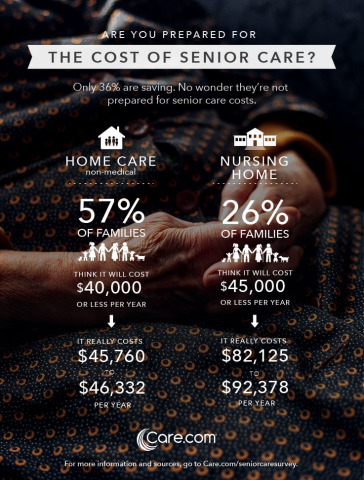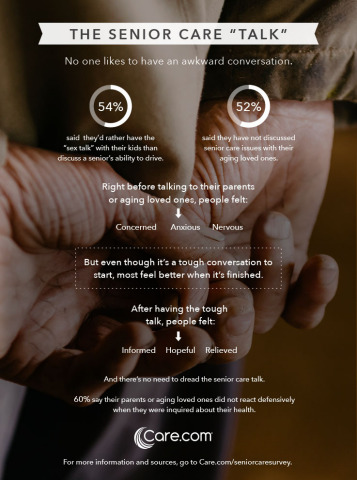WALTHAM, Mass.--(BUSINESS WIRE)--When it comes to the issue of care, the focus is frequently on child care. Yet, many families are also tackling an issue that isn’t as widely discussed and should be: senior care. The 2016 Senior Care Survey from Care.com (NYSE: CRCM, www.care.com) the world’s largest online destination for finding and managing family care, delves into the financial and emotional challenges today’s families face, the help they seek, and ultimately, reveals the misconceptions and expectations of senior care. The findings also show how families continue to struggle with talking openly about care needs with their aging parents.
“The trials and tribulations of child care are widely discussed and known,” said Jody Gastfriend, VP of Senior Care at Care.com, “However, those issues are only part of the care challenges families face. Nearly half of U.S. adults in their 40s and 50s are already in the Sandwich Generation caring for a child and an aging parent. And with the number of people over the age of 65 set to nearly double by 2050, the emotional and financial weight of senior care is only going to intensify for families.”
Care.com 2016 Senior Care Survey Findings
Senior Care Finances: Expectations & The Reality
Nearly 1/3 Provide Financial Support to Senior Loved Ones.
29%
of respondents financially support their parent(s) or aging loved
one(s), with 1 in 3 saying they provide $5,000 or more per year. 19%
provide $10,000 or more per year, while 2 out of 3 (66%) say they give
$1,000 or more to the senior in their life. Nearly 1 in 5 people (19%)
consider themselves a senior care provider.
Families Don’t Know the True Cost of Senior Care.
Whether
it’s non-medical
homecare or a nursing
home, families underestimate the costs for senior care. 67% of those
surveyed anticipate that maximum costs for full-time care in a nursing
home would fall under $80,000 annually, and approximately 1 in 4 people
(26%) think it costs half what it actually does! The reality? According
to a Genworth
survey on senior care costs, the national average cost for a nursing
home starts at $82,125 and ranges up to
$92,378. For non-medical home care, 57% believe it costs less than
$40,000 per year while the national annualized average cost actually
ranges from $45,760 to $46,332 for 44 hours per week. However, when it
comes to adult day health care, people overestimate the expense, with
61% thinking it costs more than double the actual amount of $17,680 per
year.
Despite Worries, A Majority Aren’t Budgeting or Saving for Their Own
Senior Care.
When it comes to their own senior care, people are
unprepared for and uncertain of the future. 64% are not budgeting or
saving for their own or their partner’s senior care and approximately 1
in 5 (21%) don’t know what senior care option they’d prefer for
themselves. Yet, two-thirds (66%) worry about what senior care options
will be available in the future. Alarmingly, more than half of baby
boomers (53%) say they aren’t budgeting for their or their partner’s
senior care.
“Raising awareness of the true costs of senior care is imperative for the financial health of families,” added Gastfriend. “In addition to underestimating the cost of senior care, the majority of families responding to our 2015 Cost of Care Survey also underestimate the cost of child care (63%). When you add in saving for retirement, the financial impact can be profound.”
The Emotional Side of Senior Care
Parents Would Rather Have the “Sex Talk” Than Take the Keys Away From
Aging Parents.
While a majority of people (85%) believe they
have a good grasp of their parent’s or aging loved one’s health, 52%
haven’t discussed senior care issues with them. Their top reasons to
avoid the talk include knowing their parent(s) or aging loved one(s)
would react defensively (15%) and their own discomfort with the subject
(20%). Talking about money, health, and end-of-life care is so
uncomfortable that 54% would rather have the “sex talk” with their
children than tackle a conversation about their aging parent not being
able to drive anymore. But good news from those who have already
broached the topic – 60% say the seniors in their life did not react
defensively when asked about their health.
More Than Half Don’t Plan to Talk About Senior Care Until There’s a
Need.
55% of people plan to discuss senior care issues with
aging loved ones if/when a need arises, while only 30% plan on doing so
beforehand. Those who have had the senior care talk say it was
precipitated by a major medical incident, such as a bad fall or heart
attack.
“We encourage families to proactively speak with the senior in their life about long-term care because when a health issue strikes unexpectedly, many families are unprepared for quick decisions,” said Gastfriend. “By talking about preferences and expectations before the need arises, families are in a better place to make informed decisions for the care of a loved one. Whether it’s consulting professionals to help explain your options, or researching information online, there are myriad resources available to help families navigate this sensitive, and, oftentimes, confusing topic.”
From Anxiety to Hope, Discussing Senior Care Issues Alleviates Worry.
Prior
to broaching care issues with a senior loved one, respondents feel
concerned (44%), anxious (35%), and nervous (28%). However, once adult
children start the conversation, they ultimately feel informed (33%),
hopeful (32%), and relieved (24%).
Senior Care Preferences: Planning for the Future
Approximately 1 in 3 Don’t Know What Seniors Want.
The
number one thing people think is most important to the senior in their
life is independence (42%), followed by health (23%) and comfort (23%).
However, 31% don’t know what senior care option their parent(s) or aging
loved one(s) prefer. That may be why 51% believe the senior in their
life should take the lead on long-term senior care planning.
Living With An Aging Loved One Is An Option Most Would Consider.
72%
of people would consider having their parent(s) or aging loved one(s)
live with them as a long-term senior care option. In-home care from a
relative is also one of the top three options people think aging loved
ones would prefer.
Senior Care In The Workplace
Senior Care Responsibilities Impact Employees and Employers.
With
the Sandwich Generation growing and nearly 70% dual-income households in
the U.S., senior care responsibilities are understandably having an
impact in the workplace. 36% have asked for time off or workplace
flexibility to accommodate for senior care; 36% say worrying about aging
loved ones has affected their performance at work; and 34% have made
work adjustments as a result of caring for aging loved ones. Senior care
responsibilities weigh so heavily on employees that nearly half (46%)
say they would consider dropping out of the workforce to care for an
ailing parent or loved one.
Senior Care Benefits Matter When Searching for a Job.
41% of
people say their employer does not provide any programs or assistance
for elder care but these programs are in demand, as 52% would research
benefit options available for senior care-related issues if they were to
consider a new job. Top three care-related benefits people would find
most useful are assistance finding options for senior care issues (51%),
subsidized back up care for emergencies (48%), and financial planning
for senior care (46%).
“With today’s modern workforce consisting of two working parents who are ‘sandwiched’ caring for their own children and their aging parent, companies must recognize the need for benefits that serve both ends of the caregiving spectrum,” added Michael Marty, SVP and GM of Care@Work. “Offering workplace benefits like senior care advisory services or high-quality, urgent care for children and adults not only supports the wellbeing of employees and their families, but also helps employers increase loyalty, reduce turnover costs, and drive productivity.”
About the Care.com 2016 Senior Care Survey
The
Care.com
2016 Senior Care Survey captured responses from nearly 500 people in
the United States during the month of April 2016. Respondents were
recruited from Care.com.
About Care.com
Since launching
in 2007, Care.com (NYSE:CRCM) has been committed to solving the complex
care challenges that impact families, caregivers, employers, and care
service companies. Today, Care.com is the world’s largest online
destination for finding and managing family care, with 11.0 million
families and 8.6 million caregivers* across 16 countries, including the
U.S., UK, Canada and parts of Western Europe, and approximately 800,000
employees of corporate clients having access to our services. Spanning
child care to senior care, pet care, housekeeping and more, Care.com
provides a sweeping array of services for families and caregivers to
find, manage and pay for care or find employment. These include: a
comprehensive suite of safety tools and resources members may use to
help make more informed hiring decisions - such as third-party
background check services, monitored messaging, and tips on hiring best
practices; easy ways for caregivers to be paid online or via mobile app;
and household payroll and tax services provided by Care.com HomePay.
Care.com builds employers customized benefits packages covering child
care, back up care and senior care consulting services through its
Care@Work business, and serves care businesses with marketing and
recruiting support. To connect families further, Care.com acquired
community platforms Big Tent and Kinsights in 2013 and 2015,
respectively. Headquartered in Waltham, Massachusetts, Care.com has
offices in Berlin, Austin, New York City and the San Francisco Bay area.
For more information, please visit www.care.com.
*As of March 2016.





